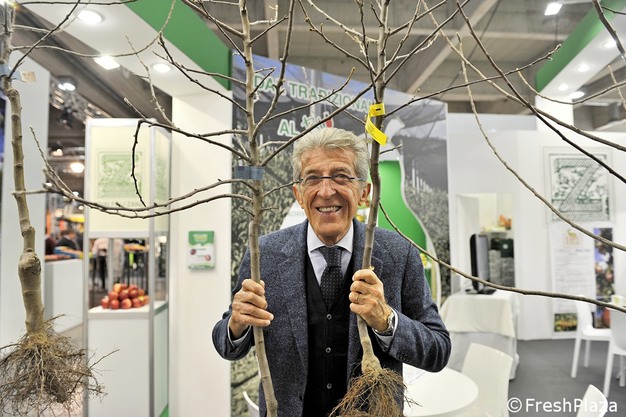“The pear sector still has prospects for the future although, at the moment, demand is higher abroad than in Italy. Of course we need to change mentality in our approach to new orchards," reports Giovanni Zanzi, co-owner of Vivai F.lli Zanzi in Ferrara, one among the leading businesses in the production and commercialization of fruit plants.
"Over the past few months, we have had lots of requests from eastern countries such as Russia, Azerbaijan, Uzbekistan, Armenia and Georgia, to name a few. The most exported varieties were Conference and Kaiser, as well as Santa Maria, William and Abate (the latter to Russia in particular)."
 Giovanni Zanzi during the last edition of Interpoma
Giovanni Zanzi during the last edition of Interpoma
The Russians are planting lots of pear trees as well as all the types of fruits possible, a sign that they are aiming to be as self-sufficient as possible. They initiated this policy well before the latest sanctions.
But Zanzi exported a lot in France and Spain too, with pear trees grafted on Fox9 rootstocks, which are suitable for stubble, resistant to limey soils and with total affinity. Demand was significant from north Africa too, especially for William, Abate, Carmen and Eden Gold, a Bendor variety. Why is it then, that the pear sector is encountering such difficulties in Italy and Emilia Romagna?
"From a nursery point of view, I can say that it has been easy for a long time to grow pears. The land enabled the use of the main rootstocks without many problems and there were no diseases that forced studies and experimentations. In addition, the soil had a sufficient percentage of organic matter, which though diminished over time. We had all the means necessary to fight diseases, and chemistry helped us defend ourselves against the most harmful pathogens. Now everything has changed: European policies and the ongoing reduction of the chemical molecules used to defend our orchards have caused difficulties. It is essential not to make mistakes."
"It is still possible to gain an income and obtain good results, but every single orchard must be studied down to the tiniest detail, crossing soil analyses with the type of rootstock and variety, plant healthy and certified trees and choose the planting area to identify any environmental problems. We must also keep climate change in mind and consider that frost, strong winds, hailstorms or drought are no longer rare, but rather frequent events."
But, while the foreign markets absorbed most volumes (Zanzi calculated 90% of exports for pears), something has moved in Italy as well. "New varieties are being planted, especially club ones. I am thinking about Fred, Eden Gold, and Crea 194, for which we hold licenses. We have worked with entrepreneurs for new Abate orchards in Reggio Emilia, Lazio, Abruzzo and Tuscany. Turandot, Coscia and Carmen (Southern Italy), Crea 194 were among the most demanded."
“The market requires innovation: pears that look good and have a captivating flavor have a bright future."

44124 Ferrara - Italy
+39 0532 719072
[email protected]
www.vivaizanzi.it
